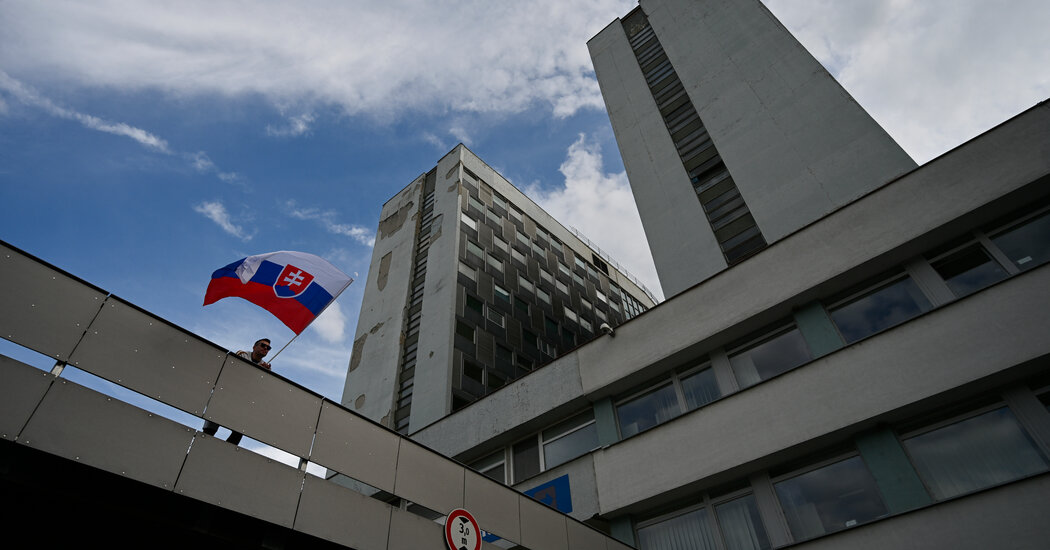
Slovak Prime Minister Robert Fico underwent further surgery, officials said Friday, as questions continued to swirl about the assassination attempt that landed him in hospital.
Authorities have kept details about the attack, the attacker and who leads the country to a minimum while the prime minister remains hospitalized, even as shock from the shooting has begun to give way to trepidation about what will happen next for the most deeply polarized country.
On Friday afternoon, Slovakia's deputy prime minister, Robert Kalinak, said the government was moving forward, telling a news conference that “all our work and tasks have been done.” He also offered an update on Mr. Fico, who he said underwent a nearly two-hour surgery but was conscious.
“I see some progress,” he told reporters outside the hospital where Mr. Fico is being treated, adding: “I'm in a much better mood now.”
Mr. Fico remains in serious but stable condition, according to the hospital director, Miriam Lapunikova. She said it was not yet known whether the prime minister would request further procedures.
The brief afternoon update – the first from officials in nearly 24 hours – is unlikely to put to rest the many outstanding questions in the aftermath of the attack.
Authorities have not yet named the suspect – who Slovakia's interior minister described as a “lone wolf” radicalized after last month's presidential election – nor said when he will appear in court to face charges of attempted premeditated murder. They called the shooting politically motivated and urged the public and politicians to reduce political rhetoric and hatred while the investigation unfolds.
Local media reported on Friday that police officers had escorted the suspect to his home in the central Slovak town of Levice, where they searched the premises and seized documents. Police did not immediately respond to a request for comment.
Details about Mr Fico's injuries and condition have also been closely guarded. Local media sources reported that doctors will meet on Monday to decide whether the prime minister can be transferred to the capital Bratislava from the intensive care unit of the central Slovak hospital where he underwent surgery. Mr Kalinak, however, said on Friday it was too early to start thinking about it.
“It is a serious situation,” he said at a press conference, expressing “full confidence” in the medical team at the Banska Bystrica hospital.
He also appears to have avoided the question of who exactly makes high-level decisions for the government. There has been no formal announcement on who will be responsible in Fico's absence, although local media quoted ministers as saying Kalinak would lead the meetings.
“He is still the prime minister and acts as he can,” Kalinak said of Fico, stressing, however, that the capabilities were limited. “I have never seen a stronger man.”
Authorities are launching two investigations – one into the attacker, the other into the response of security forces at the scene – and have urged not to rush to judgment.
Slovak officials acknowledged there is criticism of the officers' actions. Local news outlets published interviews with security experts analyzing the gunman's movements and officers' responses to try to understand how the attacker was able to fire at least five times at close range before being subdued.
The investigations are taking place against a backdrop of deep political divisions in Slovakia. Fico has pushed a hotly contested overhaul of the justice system to limit the scope of corruption investigations, and has moved to reshape the nation's broadcasting system to eliminate what the government calls liberal bias.
And senior officials from Fico's ruling Smer party have, in fact, accused liberal journalists and opposition politicians of motivating the assassination attempt through their intense criticism of the government's actions. However, Pellegrini, a Fico ally elected last month, was among the loudest voices calling for calm.
Amid a dearth of information from authorities, speculation about the attacker's identity and motives has been rife, prompting the Interior Ministry to repeatedly warn against releasing “unverified” details.
The ministry said last Thursday that “a large amount of misinformation” was circulating about the attack. On an existing ministry website dedicated to fighting hoaxes, he labeled a series of unconfirmed reports – that the suspect was a member of a Slovakian paramilitary group, that his wife was a Ukrainian refugee – as “not true,” but not offered nothing. verifiable.
As officials warned that tensions risked spreading, some in Slovakia expressed concern about whether Fico could still die, but also what might happen if he recovered.
“Polarization is very present in society today and it will get worse after this attack,” said Hana Klistincova, 34, a translator interviewed in Bratislava. “I personally don't fear that the attack will happen again – it was the impulsive behavior of one individual – but I fear the impact this will have on society because of our coalition leaders, who have started to blame the opposition and the media. After.”
Veronika Kladivikova, a 27-year-old seamstress from Banska Stiavnica, a small town in central Slovakia, said she was horrified by the attack.
“Families are also divided. I feel it in my family,” she said, as she watched his son play in a sandbox at the park.
But he said he is “not afraid right now,” adding: “I hope people are reasonable enough not to panic, or be even more against each other, divided.”
Sara Cincurova contributed a report from Bratislava.
